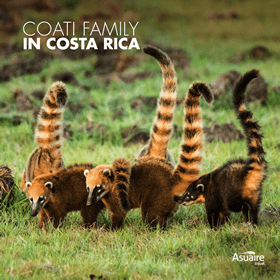Costa Rica wildlife is unique, exotic, and abundant—and the main reason many travellers set their sights on the small country for nature holidays. Located between the two Americas and two enormous seas, Costa Rica acts as a bio-geographical bridge bursting with life and natural wonders. Our rainforest- and microclimate- filled country is home to more than 500,000 species of animals, and is among the most biologically diverse countries in the word.
Costa Rica leads biodiversity conservation for developing countries, sustainable travel, and sustainability in general. More than 25% of the country is comprised of protected areas, such as national parks, wildlife refuges, conservation areas, and more.
Here are the top 10 exotic animals you might find on your Costa Rica wildlife holiday:
Jaguar: The habitat of this big cat is found almost only in protected forests. While it makes its home anywhere from Mexico to Argentina, Costa Rica has an important population of jaguars in the wild. This feline, which has a yellowish-brown coat with a white stomach and black spots all over its body, can grow to over 2 m in length, and normally weighs between 56 and 96 kg. Interestingly, the jaguar has the shortest tail of any big cat.
Sloth: The sloth has been used as an advertising symbol for many recent Costa Rican tourism campaigns. It is one of the most unique animals in the world, known for sleeping 16 to 18 hours each day, and living in the jungle canopy, coming down from the trees only once or twice a week to go to the bathroom. Three-toed sloth bodies are usually between 50 and 60 cm long. Its face looks as if it is always smiling.
Green Iguana: Also known as the common iguana or American iguana, this is a large, arboreal, mostly herbivorous species of lizard, native to Central, South America, and the Caribbean. While most iguanas grow to a length of 1.5 m from head to tail, a few species grow more than 2 m and can weigh up to 9 kg, depending on diet and habitat.
Spider Monkey: Most of the time, this monkey lives high off the ground in the canopy of tropical forests, and can be found in Costa Rica national parks, forests, mountains, and conservation areas. There are more than 9 subspecies of spider monkeys with variations in colour. Fruits form the base of this animal’s nutrition. They can grow to more than 8 kg and 1.28 m long from head to tail, but the tail is longer than the body and head combined.
White-Nosed Coati: Local names for this creature include Pizote, Coati, or Tejón. Including the tail, the average length of this animal in the racoon family is 1.1 m and it weighs about 6 kg. They can climb trees with ease, and eat vertebrates, fruits, insects, snakes and eggs. This is one of the most common animals in Costa Rica, easily found on Costa Rica wildlife tours, in areas like Monteverde and Arenal National Park.
Capuchin Monkey: Also known as the white-faced monkey, this cute creature is medium in size and weighs up to 3.9 kg and measures up to 55-50 cm in length. It is one of the most intelligent monkey species in the world, living in different kinds of forest in Costa Rica and eating a variety of fruits and other foods.
Leatherback Turtle: This turtle is the largest on earth, and can grow to be larger than the average adult man. It lives 45 years on average, and can weigh over 900 kg. It usually lives alone, but will join others to mate. This water-based animal is a predator to jellyfish. The IUCN Red List labels leatherback turtles as endangered, and they are nearly extinct in many parts of the world. However, you can find them in Costa Rica, where you’ll have a chance to spot them year round at Playa Camaronal, Playa Ostional, and Playa Nosara, just on the north side of the Guanacaste province. They nest from October to May, coming up on the beach to lay eggs.
Strawberry Poison Dart Frog: This tiny frog ranges from 2.5 cm to 5 cm, and weighs fewer than 28 g. This unique amphibian is famous for its bright and colourful skin, which contains natural venom. It is believed that indigenous people have used their poison to coat the tip of their blow darts prior to hunting, which explains the name.
Humpback Whale: This country is well known as a whale-watching destination—many Costa Rica holiday tours go to the Pacific Ocean to look for these giants that can range in length from 12–16 m and weigh about 36,000 kg as adults. Costa Rica has the distinction of providing residence to humpbacks for more months of the year than anywhere else in the world. These whales arrive from both the coasts of California and the waters of Antarctica at the beginning of their respective winters, and stay until spring returns, making whale spotting possible from July to March!
King Vulture: These birds are 68 to 82 cm in length with a wingspan of up to 2 m wide. This species of vulture usually spreads out from southern Mexico all the way to northern Argentina. They are strong scavengers and will usually be the first to arrive at a fresh kill. They are the biggest of all vultures in Costa Rica.
If you’re interested in encountering some of these and other exotic creatures, cross the pond and come on over! You won’t need to go far once you’re here. Some hotspots you’ll want to check out include Corcovado National Park, Tortuguero National Park, Chirripó Mountain, Monteverde Rainforest, Manual Antonio National Park, and the north and south highland regions.
Asuaire Travel Agency has been organising Costa Rica holidays for nearly 20 years, and we’re ready to plan your trip filled with exotic animals and new experiences. For more information, click here.
Are you ready to enjoy a true Costa Rica wildlife adventure?




